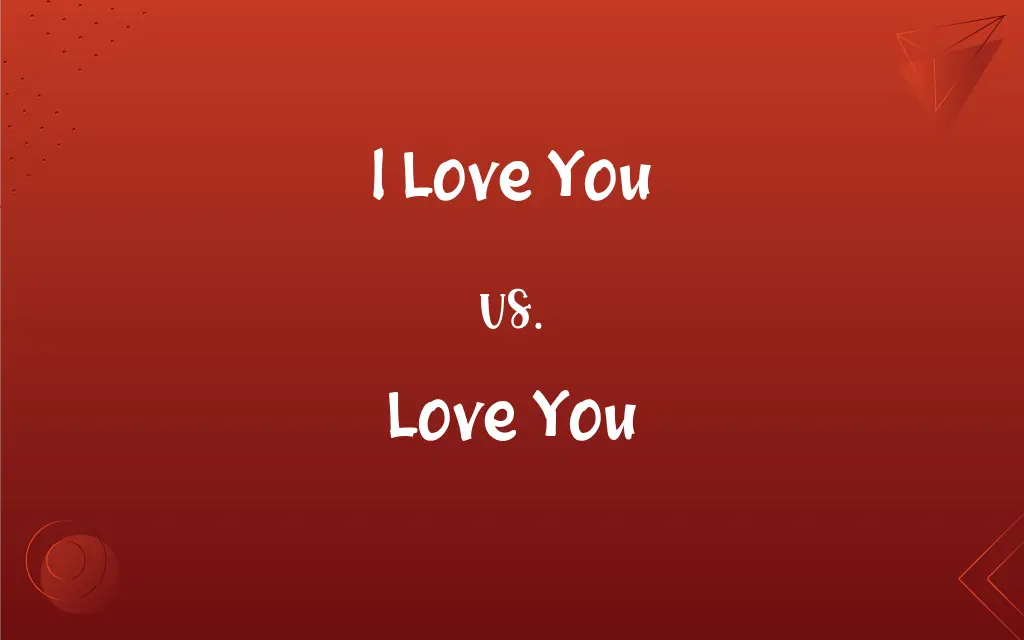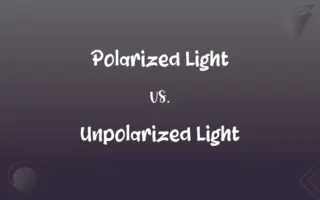I Love You vs. Love You: What's the Difference?
Edited by Harlon Moss || By Aimie Carlson || Updated on October 2, 2023
"I love you" is a full, direct expression of love, whereas "love you" is a casual and sometimes informal variant, both conveying affection.

Key Differences
"I love you" holds a comprehensive expression of deep emotion and genuine sentiment towards someone. On the other side, "love you" also conveys affection but in a somewhat lighter, sometimes more informal or friendly context. The gravity of "I love you" generally finds itself embedded within romantic, familial, or deep relational contexts where the expression of full, unabridged emotion is warranted.
The phrase "I love you" often serves as a pivotal point in relationships, signifying a deepening of emotional connectivity and often being used judiciously to communicate genuine, heartfelt emotion. In contrast, "love you" maintains a flexible usability in various contexts, which might be amicable, familial, or romantic, offering a versatile expression of affection without the same depth of commitment that "I love you" usually implies.
"I love you" traditionally operates within explicit emotional revelations, often utilized to explicitly declare one’s feelings and establish emotional milestones within relationships. Whereas "love you" permeates varied interactional scenarios, being employed among friends, family, or lovers, often without the necessity of being emotionally monumental or laden with deep, vulnerable sentiment.
Linguistically, “I love you” stands as a complete sentence with a clear subject, verb, and object, rendering it formally structured and grammatically complete. In contrast, “love you” omits the subject, aligning itself more with colloquial, conversational usage where grammatical preciseness is often relaxed, thereby creating a linguistic distinction that mirrors their emotional and contextual differences.
In cultural contexts, "I love you" often represents a potent expression embedded within pivotal moments, celebrated in literature, cinema, and music as an epitome of emotional expression, while "love you" finds a home in casual exchanges, endearing interactions, and friendly relationships, demonstrating the cultural and expressive diversity that language accommodates within the sphere of emotional communication.
ADVERTISEMENT
Comparison Chart
Formality
Formal and structured
Informal and casual
Emotional Weight
Heavier emotional significance
Lighter emotional significance
Grammatical Completeness
Complete sentence
Incomplete sentence
Usage Context
Romantic, deep emotional contexts
Versatile, including friendly contexts
Cultural Representation
Often epitomized in pivotal emotional moments
Common in casual, everyday interactions
ADVERTISEMENT
I Love You and Love You Definitions
I Love You
A declaration often marking emotional milestones.
When she said I love you, it changed their relationship.
Love You
A versatile expression suitable in various contexts.
Love you, buddy, he said to his friend.
I Love You
A full sentence expressing romantic feelings.
I love you was written in the letter he left behind.
Love You
Can be used without deeply romantic connotations.
Love you, sis, is common among siblings.
I Love You
A complete, heartfelt expression of love.
He whispered I love you as they gazed at the stars.
Love You
A colloquial expression of affection or warmth.
Love you too, she responded cheerfully.
I Love You
Symbolic of deep emotional and romantic expressions.
The protagonist declared I love you in a poignant scene.
Love You
An informal expression of love.
She smiled, waving goodbye, Love you!
I Love You
Used to affirm strong emotions and commitment.
I love you often signifies a promise of fidelity.
Love You
Often used in relaxed, casual interactions.
Thanks for the favor, love you!
FAQs
What does "I love you" express?
"I love you" conveys a deep, personal affection or attachment towards someone.
When is "I love you" typically used?
It's often used in romantic, familial, or close friendship contexts to express heartfelt love.
Is "I love you" formal?
It is not necessarily formal, but it is often perceived as a strong, sincere expression of emotion.
Can "Love you" be used in familial contexts?
Certainly, "Love you" is commonly used among family members to express love and affection.
Does "I love you" convey commitment?
Often, yes. In romantic contexts, it's frequently associated with a level of commitment.
Can "I love you" be used platonically?
Yes, "I love you" can express non-romantic love between friends or family members.
Does "Love you" always convey deep emotion?
Not necessarily; while it expresses affection, it may not always convey deep or committed feelings.
How is "I love you" used in writing?
It is used as a standalone phrase or part of a sentence to convey affection in written communications.
Can "I love you" be casual?
Typically, it's not considered casual due to the weightiness of the emotion it conveys.
How often is "Love you" used?
Usage varies among individuals and relationships; some use it frequently, while others might reserve it for specific occasions.
Can "I love you" be used in early relationships?
It depends on personal feelings and dynamics; there’s no universal right time to use it.
Does culture impact the use of "I love you"?
Yes, cultural norms may influence how often and in what contexts "I love you" is used.
When can "Love you" be used?
It may be used in similar contexts to "I love you," but often with a more casual or spontaneous tone.
Is "Love you" appropriate for all age groups?
Yes, "Love you" is often used among people of all ages to express affection.
Can "Love you" be used towards pets?
Yes, people often use "Love you" towards pets as a casual expression of affection.
How is "Love you" perceived differently from "I love you"?
"Love you" might be seen as more casual or less intense than "I love you."
Can "Love you" be used in texts?
Yes, "Love you" is commonly used in text messages, emails, and other informal written communications.
Is it common in all languages?
Expressions of love exist in all languages, but frequency and context of use can vary widely.
Can "Love you" be used platonically?
Absolutely, "Love you" can be used between friends or family members without romantic implications.
Is "Love you" informal?
Generally, yes. "Love you" tends to be lighter and may be used more casually.
About Author
Written by
Aimie CarlsonAimie Carlson, holding a master's degree in English literature, is a fervent English language enthusiast. She lends her writing talents to Difference Wiki, a prominent website that specializes in comparisons, offering readers insightful analyses that both captivate and inform.
Edited by
Harlon MossHarlon is a seasoned quality moderator and accomplished content writer for Difference Wiki. An alumnus of the prestigious University of California, he earned his degree in Computer Science. Leveraging his academic background, Harlon brings a meticulous and informed perspective to his work, ensuring content accuracy and excellence.
































































